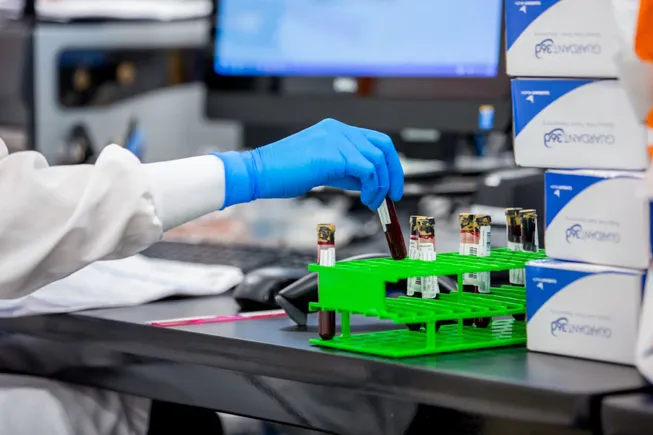Dive Brief:
- A Food and Drug Administration advisory committee on Thursday recommended the agency approve Guardant’s Health’s blood test for colorectal cancer, concluding the potential benefits of the screening outweigh its risks in a 7-2 vote.
- Guardant’s test is intended to detect colorectal cancer by sequencing the cell-free DNA isolated from a patient’s blood sample.
- The molecular and clinical genetics panel of the Medical Devices Advisory Committee also voted 8 to 1 in favor of the safety of Guardant’s test and 6 to 3 that there is reasonable assurance it is effective.
Dive Insight:
Guardant has proposed the Shield test as a choice for average-risk people over 45 years old. While colonoscopy remains the gold standard for colon cancer detection, and other screening options including stool-based tests are widely available, Guardant believes the convenience of a blood test will increase patient participation.
“Providing people with this blood test alongside other non-invasive stool tests can increase the rate of colorectal screening and potentially reduce preventable [colorectal cancer] deaths,” Guardant co-CEO AmirAli Talasaz said in a statement after the vote.
Deliberations among the panelists, whose recommendations are non-binding, centered on concerns about a lack of test sensitivity in early stages of the disease and the potential that false negative results could deter patients from other testing and lead to delays in treatment.
Panel members focused on the test’s limitations in detecting advanced adenomas, which are non-cancerous tumors that can develop into cancer. Patients with advanced adenomas have a high risk of developing colorectal cancer.
Guardant’s Eclipse study showed the Shield test had colorectal cancer sensitivity of 83.1%, but advanced adenoma sensitivity of only 13.2%.
Hopes for better patient adherence to a screening regimen helped overcome concerns about the advanced adenoma sensitivity and detection of stage I cancer, Leerink Partners analyst Puneet Souda wrote in a report after the vote.
Panelists stressed the need for labeling and education for physicians and patients to make clear that the test does not offer prevention benefits for advanced adenoma, added Souda.
William Blair analyst Andrew Brackmann said the FDA appears on its way to approving Shield.
Still, “the panel had many concerns over how Shield might be positioned given, among other items, the weak performance in detecting stage I cancers (55% sensitivity), advanced adenomas (13% sensitivity), and the related high false negative rates – which the FDA specifically commented was a reason for calling the AdCom,” Brackmann wrote in a note to clients.
“The favorable panel vote does not by any means imply this test will become an overnight success,” said Brackmann.
Canaccord Genuity analyst Kyle Mikson noted that panel members stressed Shield should not be a replacement for colonoscopy.
“One of the principal questions related to Shield is if the test can be a primary (i.e., first-line) screening tool,” Mikson said. “This appears to be the product’s intended indication for use. Although the panelists ultimately decided the benefits of the test outweigh the risks, the individuals did not appear to specifically support first-line use of Shield.”
Guardant rival Exact Sciences is also developing a blood test for colorectal cancer and makes the Cologuard stool-based screening test.
In a statement to MedTech Dive after the panel vote, Exact Sciences said it believes that blood tests should be reserved for people who are unable or unwilling to be screened using first-line options currently endorsed by national guidelines.
“While we believe blood tests have a role to play as a supplementary screening tool and are developing a blood test of our own, it is our view that any new first-line screening innovations must demonstrate performance that is comparable to the effective options that are available today,” said Paul Limburg, Exact Sciences’ chief medical officer for screening.
Guardant expects the FDA to decide whether to approve Shield later this year.

